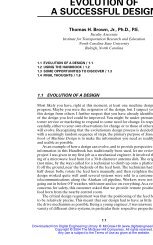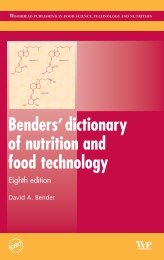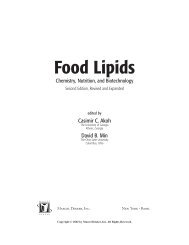- Page 2:
Second Edition THE SCIENCE OF WATER
- Page 5 and 6:
Cover Image: Falling Spring at Fall
- Page 8 and 9:
Contents Preface ..................
- Page 10 and 11:
Contents ix Velocity Head .........
- Page 12 and 13:
Contents xi Specifi c Conductance .
- Page 14 and 15:
Contents xiii (5) Beetles (Order: C
- Page 16 and 17:
Contents xv Chlorine Residual Testi
- Page 18:
Contents xvii Water Filtration Calc
- Page 22:
To the Reader In reading this text,
- Page 26 and 27:
1 Introduction When color photograp
- Page 28 and 29:
Introduction 3 On second look, we s
- Page 30 and 31:
Introduction 5 As mentioned earlier
- Page 32 and 33:
Introduction 7 This scream of lost
- Page 34:
Introduction 9 Metcalf & Eddy, Inc.
- Page 37 and 38:
12 The Science of Water: Concepts a
- Page 39 and 40:
14 The Science of Water: Concepts a
- Page 41 and 42:
16 The Science of Water: Concepts a
- Page 43 and 44:
18 The Science of Water: Concepts a
- Page 45 and 46:
20 The Science of Water: Concepts a
- Page 47 and 48:
22 The Science of Water: Concepts a
- Page 49 and 50:
24 The Science of Water: Concepts a
- Page 51 and 52:
26 The Science of Water: Concepts a
- Page 53 and 54:
28 The Science of Water: Concepts a
- Page 55 and 56:
30 The Science of Water: Concepts a
- Page 57 and 58:
32 The Science of Water: Concepts a
- Page 59 and 60:
34 The Science of Water: Concepts a
- Page 61 and 62:
36 The Science of Water: Concepts a
- Page 63 and 64:
38 The Science of Water: Concepts a
- Page 65 and 66:
40 The Science of Water: Concepts a
- Page 67 and 68:
42 The Science of Water: Concepts a
- Page 70 and 71: 3 Water Hydraulics Anyone who has t
- Page 72 and 73: Water Hydraulics 47 Another relatio
- Page 74 and 75: Water Hydraulics 49 • • 1 ft 3
- Page 76 and 77: Water Hydraulics 51 √ Important P
- Page 78 and 79: Water Hydraulics 53 FIGURE 3.4 Thru
- Page 80 and 81: Water Hydraulics 55 Example 3.8 Pro
- Page 82 and 83: Water Hydraulics 57 FIGURE 3.6 Lami
- Page 84 and 85: Water Hydraulics 59 With regard to
- Page 86 and 87: Water Hydraulics 61 or hydraulic gr
- Page 88 and 89: Water Hydraulics 63 E 1 smaller fl
- Page 90 and 91: Water Hydraulics 65 √ Note: In de
- Page 92 and 93: Water Hydraulics 67 • Cone of dep
- Page 94 and 95: Water Hydraulics 69 • • • •
- Page 96 and 97: Water Hydraulics 71 The Darcy-Weisb
- Page 98 and 99: Water Hydraulics 73 Of course, pipe
- Page 100 and 101: Water Hydraulics 75 In this section
- Page 102 and 103: Water Hydraulics 77 Slope (S) The s
- Page 104 and 105: Water Hydraulics 79 and important c
- Page 106 and 107: Water Hydraulics 81 and the depth o
- Page 108 and 109: Water Hydraulics 83 TYPES OF DIFFER
- Page 110 and 111: Water Hydraulics 85 √ Important P
- Page 112 and 113: Water Hydraulics 87 Meter backpress
- Page 114 and 115: Water Hydraulics 89 VELOCITY FLOWME
- Page 116 and 117: Water Hydraulics 91 The positive-di
- Page 118 and 119: Water Hydraulics 93 Solution: 1200g
- Page 120: Water Hydraulics 95 Water and Waste
- Page 125 and 126: 100 The Science of Water: Concepts
- Page 127 and 128: 102 The Science of Water: Concepts
- Page 129 and 130: 104 The Science of Water: Concepts
- Page 131 and 132: 106 The Science of Water: Concepts
- Page 133 and 134: 108 The Science of Water: Concepts
- Page 135 and 136: 110 The Science of Water: Concepts
- Page 137 and 138: 112 The Science of Water: Concepts
- Page 139 and 140: 114 The Science of Water: Concepts
- Page 141 and 142: 116 The Science of Water: Concepts
- Page 143 and 144: 118 The Science of Water: Concepts
- Page 145 and 146: 120 The Science of Water: Concepts
- Page 147 and 148: 122 The Science of Water: Concepts
- Page 149 and 150: 124 The Science of Water: Concepts
- Page 151 and 152: 126 The Science of Water: Concepts
- Page 153 and 154: 128 The Science of Water: Concepts
- Page 155 and 156: 130 The Science of Water: Concepts
- Page 157 and 158: 132 The Science of Water: Concepts
- Page 159 and 160: 134 The Science of Water: Concepts
- Page 161 and 162: 136 The Science of Water: Concepts
- Page 163 and 164: 138 The Science of Water: Concepts
- Page 165 and 166: 140 The Science of Water: Concepts
- Page 167 and 168: 142 The Science of Water: Concepts
- Page 169 and 170: 144 The Science of Water: Concepts
- Page 171 and 172:
146 The Science of Water: Concepts
- Page 173 and 174:
148 The Science of Water: Concepts
- Page 175 and 176:
150 The Science of Water: Concepts
- Page 177 and 178:
152 The Science of Water: Concepts
- Page 180 and 181:
6 Water Ecology The subject of man
- Page 182 and 183:
Water Ecology 157 The environment i
- Page 184 and 185:
Water Ecology 159 FIGURE 6.2 Notone
- Page 186 and 187:
Water Ecology 161 H 2 O O 2 FIGURE
- Page 188 and 189:
Water Ecology 163 FeS FIGURE 6.6 Th
- Page 190 and 191:
Water Ecology 165 Algae FIGURE 6.8
- Page 192 and 193:
Water Ecology 167 2. Likewise, biom
- Page 194 and 195:
Water Ecology 169 Population densit
- Page 196 and 197:
Water Ecology 171 succession can be
- Page 198 and 199:
Water Ecology 173 dark winter month
- Page 200 and 201:
Water Ecology 175 In rain events wh
- Page 202 and 203:
Water Ecology 177 long profi le, cr
- Page 204 and 205:
Water Ecology 179 THE FLOODPLAIN A
- Page 206 and 207:
Water Ecology 181 It is important t
- Page 208 and 209:
Water Ecology 183 Specifi c Adaptat
- Page 210 and 211:
Water Ecology 185 serve to indicate
- Page 212 and 213:
Water Ecology 187 UNITS OF ORGANIZA
- Page 214 and 215:
Water Ecology 189 FIGURE 6.20 Stone
- Page 216 and 217:
Water Ecology 191 FIGURE 6.22 Midge
- Page 218 and 219:
Water Ecology 193 FIGURE 6.25 Riffl
- Page 220 and 221:
Water Ecology 195 They push their m
- Page 222 and 223:
Water Ecology 197 FIGURE 6.32 Damse
- Page 224:
Water Ecology 199 Darwin, C., 1998.
- Page 227 and 228:
202 The Science of Water: Concepts
- Page 229 and 230:
204 The Science of Water: Concepts
- Page 231 and 232:
206 The Science of Water: Concepts
- Page 233 and 234:
208 The Science of Water: Concepts
- Page 235 and 236:
210 The Science of Water: Concepts
- Page 237 and 238:
212 The Science of Water: Concepts
- Page 239 and 240:
214 The Science of Water: Concepts
- Page 241 and 242:
216 The Science of Water: Concepts
- Page 243 and 244:
218 The Science of Water: Concepts
- Page 245 and 246:
220 The Science of Water: Concepts
- Page 247 and 248:
222 The Science of Water: Concepts
- Page 249 and 250:
224 The Science of Water: Concepts
- Page 251 and 252:
226 The Science of Water: Concepts
- Page 253 and 254:
228 The Science of Water: Concepts
- Page 255 and 256:
230 The Science of Water: Concepts
- Page 257 and 258:
232 The Science of Water: Concepts
- Page 259 and 260:
234 The Science of Water: Concepts
- Page 261 and 262:
236 The Science of Water: Concepts
- Page 263 and 264:
238 The Science of Water: Concepts
- Page 265 and 266:
240 The Science of Water: Concepts
- Page 267 and 268:
242 The Science of Water: Concepts
- Page 269 and 270:
244 The Science of Water: Concepts
- Page 271 and 272:
246 The Science of Water: Concepts
- Page 273 and 274:
248 The Science of Water: Concepts
- Page 275 and 276:
250 The Science of Water: Concepts
- Page 277 and 278:
252 The Science of Water: Concepts
- Page 279 and 280:
254 The Science of Water: Concepts
- Page 281 and 282:
256 The Science of Water: Concepts
- Page 283 and 284:
258 The Science of Water: Concepts
- Page 285 and 286:
260 The Science of Water: Concepts
- Page 287 and 288:
262 The Science of Water: Concepts
- Page 289 and 290:
264 The Science of Water: Concepts
- Page 291 and 292:
266 The Science of Water: Concepts
- Page 293 and 294:
268 The Science of Water: Concepts
- Page 295 and 296:
270 The Science of Water: Concepts
- Page 297 and 298:
272 The Science of Water: Concepts
- Page 299 and 300:
274 The Science of Water: Concepts
- Page 301 and 302:
276 The Science of Water: Concepts
- Page 303 and 304:
278 The Science of Water: Concepts
- Page 305 and 306:
280 The Science of Water: Concepts
- Page 307 and 308:
282 The Science of Water: Concepts
- Page 309 and 310:
284 The Science of Water: Concepts
- Page 311 and 312:
286 The Science of Water: Concepts
- Page 313 and 314:
288 The Science of Water: Concepts
- Page 315 and 316:
290 The Science of Water: Concepts
- Page 317 and 318:
292 The Science of Water: Concepts
- Page 319 and 320:
294 The Science of Water: Concepts
- Page 321 and 322:
296 The Science of Water: Concepts
- Page 323 and 324:
298 The Science of Water: Concepts
- Page 325 and 326:
300 The Science of Water: Concepts
- Page 327 and 328:
302 The Science of Water: Concepts
- Page 329 and 330:
304 The Science of Water: Concepts
- Page 331 and 332:
306 The Science of Water: Concepts
- Page 333 and 334:
308 The Science of Water: Concepts
- Page 335 and 336:
310 The Science of Water: Concepts
- Page 337 and 338:
312 The Science of Water: Concepts
- Page 339 and 340:
314 The Science of Water: Concepts
- Page 341 and 342:
316 The Science of Water: Concepts
- Page 343 and 344:
318 The Science of Water: Concepts
- Page 345 and 346:
320 The Science of Water: Concepts
- Page 347 and 348:
322 The Science of Water: Concepts
- Page 350 and 351:
10 Water Treatment Calculations Gup
- Page 352 and 353:
Water Treatment Calculations 327 We
- Page 354 and 355:
Water Treatment Calculations 329 Th
- Page 356 and 357:
Water Treatment Calculations 331 Th
- Page 358 and 359:
Water Treatment Calculations 333 Ex
- Page 360 and 361:
Water Treatment Calculations 335 me
- Page 362 and 363:
Water Treatment Calculations 337 Fo
- Page 364 and 365:
Water Treatment Calculations 339 Ex
- Page 366 and 367:
Water Treatment Calculations 341 So
- Page 368 and 369:
Water Treatment Calculations 343 No
- Page 370 and 371:
Water Treatment Calculations 345 Th
- Page 372 and 373:
Water Treatment Calculations 347 So
- Page 374 and 375:
Water Treatment Calculations 349 In
- Page 376 and 377:
Water Treatment Calculations 351 Ex
- Page 378 and 379:
Water Treatment Calculations 353 Th
- Page 380 and 381:
Water Treatment Calculations 355 So
- Page 382 and 383:
Water Treatment Calculations 357 Ex
- Page 384 and 385:
Water Treatment Calculations 359 Ex
- Page 386 and 387:
Water Treatment Calculations 361 Th
- Page 388 and 389:
Water Treatment Calculations 363 St
- Page 390 and 391:
Water Treatment Calculations 365 WA
- Page 392 and 393:
Water Treatment Calculations 367 St
- Page 394 and 395:
Water Treatment Calculations 369 Th
- Page 396 and 397:
Water Treatment Calculations 371 So
- Page 398 and 399:
Water Treatment Calculations 373 So
- Page 400 and 401:
Water Treatment Calculations 375 Ex
- Page 402 and 403:
Water Treatment Calculations 377 Ex
- Page 404 and 405:
Water Treatment Calculations 379 Se
- Page 406 and 407:
Water Treatment Calculations 381 µ
- Page 408 and 409:
Water Treatment Calculations 383 g
- Page 410 and 411:
Water Treatment Calculations 385 Ex
- Page 412 and 413:
Water Treatment Calculations 387 No
- Page 414 and 415:
Water Treatment Calculations 389 Ex
- Page 416 and 417:
Water Treatment Calculations 391 So
- Page 418 and 419:
Water Treatment Calculations 393 So
- Page 420 and 421:
Water Treatment Calculations 395 Ca
- Page 422 and 423:
Water Treatment Calculations 397 Ex
- Page 424:
Water Treatment Calculations 399 Mo
- Page 427 and 428:
402 The Science of Water: Concepts
- Page 429 and 430:
404 The Science of Water: Concepts
- Page 431 and 432:
406 The Science of Water: Concepts
- Page 433 and 434:
408 The Science of Water: Concepts
- Page 435 and 436:
410 The Science of Water: Concepts
- Page 437 and 438:
412 The Science of Water: Concepts
- Page 439 and 440:
414 The Science of Water: Concepts
- Page 441 and 442:
416 The Science of Water: Concepts
- Page 443 and 444:
418 The Science of Water: Concepts
- Page 445 and 446:
420 The Science of Water: Concepts
- Page 447:
422 The Science of Water: Concepts






